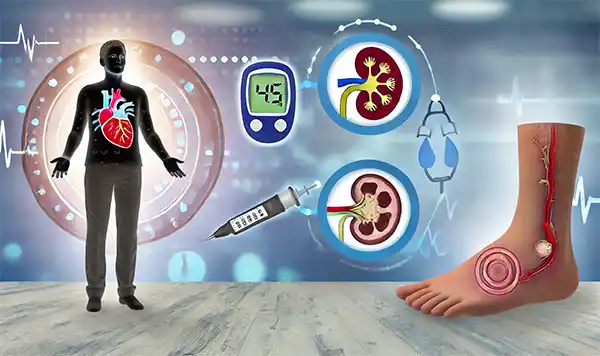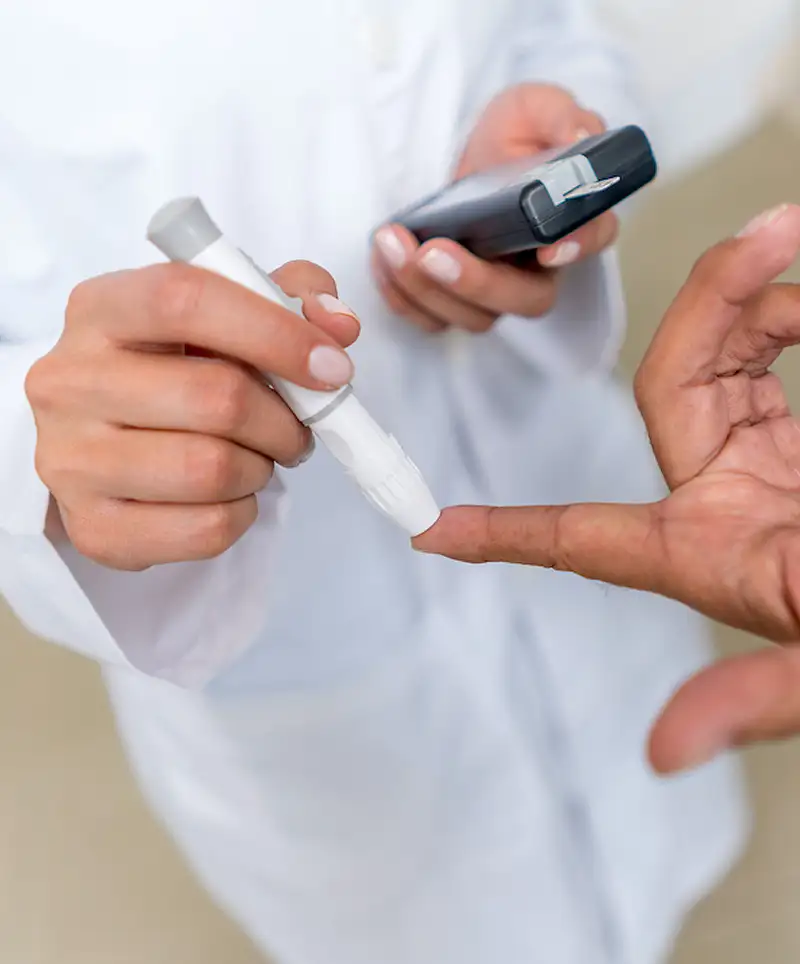A Time for Awareness and Action
November, designated National Diabetes Month, is a time of heightened focus and public education about diabetes, a complex and widespread chronic health condition. Affecting millions of individuals globally, diabetes is primarily identified by unusually high glucose (sugar) levels in the bloodstream, a state that can lead to various health complications over time.
Diabetes manifests primarily in two distinct forms, each with unique characteristics and management challenges. Type 1 diabetes, often diagnosed in children and young adults, is an autoimmune condition where the body's immune system mistakenly attacks and destroys insulin-producing cells in the pancreas. As a result, individuals with Type 1 diabetes produce little to no insulin, the hormone responsible for regulating blood sugar levels. Managing this type of diabetes typically requires lifelong insulin therapy and careful daily monitoring of blood sugar levels.
On the other hand, Type 2 diabetes, which is more common and usually develops in adults, occurs when the body becomes resistant to insulin or when the pancreas does not produce enough insulin. This resistance leads to elevated glucose levels in the blood. Unlike Type 1, Type 2 diabetes can sometimes be managed and even prevented through lifestyle changes such as diet, exercise, and maintaining a healthy weight. However, many individuals may also require medication or insulin therapy as the disease progresses.
Both types of diabetes necessitate a comprehensive approach to management, encompassing medical treatment, lifestyle adjustments, and regular monitoring to prevent complications. National Diabetes Month seeks to shed light on these challenges and the realities of living with diabetes while also driving advancements in treatment and support for those affected by this condition. The month is about raising awareness and fostering a deeper understanding of the disease, promoting early diagnosis, and encouraging proactive health management, making it a critical period for public health education and advocacy.
The Significance of National Diabetes Month
 National Diabetes Month is a pivotal time of year, highlighting the far-reaching effects of diabetes on individuals and societies worldwide. This month-long observance plays a vital role in not only drawing attention to the prevalence of diabetes but also in deepening public understanding of its impact.
National Diabetes Month is a pivotal time of year, highlighting the far-reaching effects of diabetes on individuals and societies worldwide. This month-long observance plays a vital role in not only drawing attention to the prevalence of diabetes but also in deepening public understanding of its impact.
Elevating Public Knowledge: One of the primary objectives of National Diabetes Month is to educate the public about the various risk factors associated with diabetes. These include family history, age, ethnicity, and lifestyle factors like diet and physical activity. By increasing awareness of these risk factors, the month aims to empower individuals to take proactive steps in diabetes prevention and early detection.
Addressing Symptoms and Management: Another critical aspect of this month is to inform people about the symptoms of diabetes, which often go unnoticed until the condition becomes severe. If recognized early, symptoms like increased thirst, frequent urination, fatigue, and blurred vision can lead to timely diagnosis and treatment, significantly improving outcomes. The month also emphasizes the importance of effective management strategies for those with diabetes, including medication adherence, regular blood glucose monitoring, and lifestyle modifications.
Debunking Myths and Misconceptions: Diabetes is surrounded by numerous myths and misconceptions, which can lead to stigma, misinformation, and ineffective management of the condition. National Diabetes Month provides an opportunity to dispel these myths, such as the misconception that diabetes is not a serious disease or that it is solely a result of poor lifestyle choices. By confronting these inaccuracies head-on, the month contributes to a more informed and empathetic understanding of diabetes.
Advocacy and Community Involvement: This month also serves as a platform for advocacy efforts, calling for better healthcare policies, improved access to diabetes care, and more funding for research. It's a time when healthcare organizations, communities, and individuals unite to amplify the voice of the diabetes community, advocating for change and better resources.
The Role of Media and Campaigns: Media campaigns and community events play a significant role in National Diabetes Month. These initiatives aim to reach a broad audience, sharing stories of those living with diabetes, providing educational resources, and highlighting the latest advancements in diabetes care and research.
In summary, National Diabetes Month is more than just an annual observance; it's a concerted effort to transform the landscape of diabetes awareness, education, and care. By focusing on these various aspects, this significant month works towards a world where the burden of diabetes is reduced, and the quality of life for those affected is greatly enhanced.
Spreading Awareness: Education is a cornerstone of this month. Activities and campaigns focus on informing people about the importance of screening, early diagnosis, and diabetes management. This knowledge is vital in preventing complications such as heart disease, stroke, kidney failure, vision loss, and lower limb amputation.
Advocacy and Support: National Diabetes Month also emphasizes the importance of support for individuals living with diabetes. Advocacy efforts often aim at improving access to essential medicines like insulin, diagnostic tools, and educational resources. Communities come together to offer support, share experiences, and empower those affected by diabetes.
 Managing Diabetes
Managing Diabetes
Living with diabetes requires careful management, which includes monitoring blood sugar levels, maintaining a balanced diet, engaging in regular physical activity, and adhering to medication regimes. It's also crucial for individuals to work closely with healthcare professionals to tailor a management plan that suits their specific needs.
Advancements in technology have significantly improved diabetes management. Continuous glucose monitoring systems and insulin pumps have made it easier for people with diabetes to keep track of their blood sugar levels and manage insulin dosing.
Diet and exercise play a crucial role in managing diabetes. A balanced diet rich in fruits, vegetables, whole grains, and lean proteins, combined with regular physical activity, can help maintain blood sugar levels and prevent complications.
The Future of Diabetes Care
The future of diabetes care looks promising, driven by relentless research and groundbreaking advancements. This field is rapidly evolving, with scientists and medical professionals tirelessly working to revolutionize how diabetes is treated and managed.
One of the most exciting areas of diabetes research involves developing new treatment methods that could offer more effective control of blood sugar levels with fewer side effects. This includes exploring new medication classes, insulin delivery systems, and even transplantation therapies, such as pancreatic islet cell transplants, which could potentially restore the body's ability to produce insulin naturally.
The quest for a cure for diabetes is a major focus of current research. While a definitive cure is yet to be found, progress in areas like stem cell research and immunotherapy offers hope. These approaches aim at regenerating or repairing insulin-producing cells or modulating the immune system to prevent the destruction of these cells, particularly in the case of Type 1 diabetes.
Technological advancements are revolutionizing diabetes management. Continuous glucose monitoring systems and insulin pumps are becoming more sophisticated, offering more precise control of blood sugar levels and greater convenience for users. Artificial pancreas systems, which combine sensor and insulin pump technology with algorithm-driven software to automate insulin delivery, are also a significant development area.
Future diabetes care is also moving towards personalized medicine. This approach tailors treatment plans to individual patients based on their unique genetic makeup, lifestyle, and specific condition characteristics. By understanding the patient's specific diabetes profile, treatments can be more effectively targeted, improving outcomes and reducing the risk of complications.
Preventive care and lifestyle intervention remain key components in the fight against diabetes, especially Type 2. Research into the effects of diet, exercise, and other lifestyle factors on diabetes prevention and management is ongoing. This knowledge helps in formulating public health strategies and individualized plans to prevent the onset of diabetes or to manage it more effectively.
Enhanced collaboration between researchers, healthcare providers, and patients is also a significant aspect of the future of diabetes care. Increased awareness and education among the public and healthcare professionals ensure that the latest findings are quickly translated into improved care.
Finally, addressing diabetes care on a global scale is crucial. As diabetes becomes increasingly prevalent worldwide, international efforts are focused on improving access to care in low—and middle-income countries, where resources for diabetes management are often limited.
A blend of scientific innovation, technological advancements, personalized treatment approaches, and a strong emphasis on prevention and global health equity characterizes the future of diabetes care. With ongoing research and awareness, the prospect of better managing diabetes, improving the quality of life for those affected, and eventually finding a cure becomes increasingly attainable.
National Diabetes Month is more than just a campaign; it's a movement towards a world where diabetes can be effectively managed and eventually cured. It's a time for individuals, healthcare professionals, and communities to unite in the fight against diabetes, making strides toward better health and quality of life for those affected.
Please Share our Content






 National Diabetes Month is a pivotal time of year, highlighting the far-reaching effects of diabetes on individuals and societies worldwide. This month-long observance plays a vital role in not only drawing attention to the prevalence of diabetes but also in deepening public understanding of its impact.
National Diabetes Month is a pivotal time of year, highlighting the far-reaching effects of diabetes on individuals and societies worldwide. This month-long observance plays a vital role in not only drawing attention to the prevalence of diabetes but also in deepening public understanding of its impact. Managing Diabetes
Managing Diabetes








 "Sláinte!" is a traditional Irish expression used as a toast, equivalent to "Cheers!" in English.
"Sláinte!" is a traditional Irish expression used as a toast, equivalent to "Cheers!" in English.